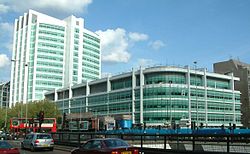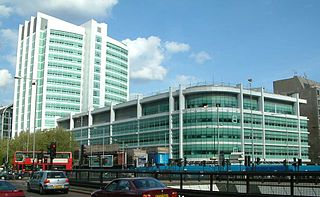
University College Hospital (UCH) is a teaching hospital in the Fitzrovia area of the London Borough of Camden, England. The hospital, which was founded as the North London Hospital in 1834, is closely associated with University College London (UCL), whose main campus is situated next door. The hospital is part of the University College London Hospitals NHS Foundation Trust

The John Radcliffe Hospital is a large tertiary teaching hospital in Oxford, England. It forms part of the Oxford University Hospitals NHS Foundation Trust and is named after John Radcliffe, an 18th-century physician and Oxford University graduate, who endowed the Radcliffe Infirmary, the main hospital for Oxford from 1770 until 2007.

The Royal National Throat, Nose and Ear Hospital was a health facility on Gray's Inn Road in London. It closed in October 2019 when services transferred to the new Royal National ENT and Eastman Dental Hospitals on Huntley Street, London, WC1E 6DG. The Huntley Street hospital continues to provide specialist ENT, sleeps and allergy services and is part of University College London Hospitals NHS Foundation Trust.

South London and Maudsley NHS Foundation Trust, also known as SLaM, is an NHS foundation trust based in London, England, which specialises in mental health. It comprises three psychiatric hospitals, the Ladywell Unit based at University Hospital Lewisham, and over 100 community sites and 300 clinical teams. SLaM forms part of the institutions that make up King's Health Partners, an academic health science centre.
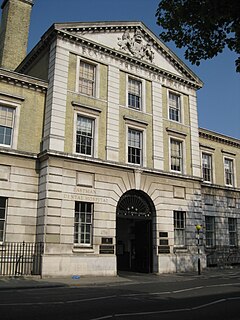
The Eastman Dental Hospital was based on Gray's Inn Road until it co-located with the University College London ear, nose, throat, balance and hearing services on Huntley Street, London as the Royal National ENT and Eastman Dental Hospitals in October 2019. The hospital continues to provide specialist dental treatment as well as ear, nose, throat, hearing, speech and balance services and is part of the University College London Hospitals NHS Foundation Trust.
UCLPartners is an academic health science centre located in London, England. It is the largest academic health science centre in the world, treats more than 1.5 million patients each year, has a combined annual turnover of around £2 billion and includes around 3,500 scientists, senior researchers and consultants.
University College London Hospitals NHS Foundation Trust (UCLH) is an NHS foundation trust based in London, United Kingdom. It comprises University College Hospital, University College Hospital at Westmoreland Street, the UCH Macmillan Cancer Centre, the Royal National ENT and Eastman Dental Hospitals, the Hospital for Tropical Diseases, the National Hospital for Neurology and Neurosurgery, the Royal London Hospital for Integrated Medicine and the Royal National Throat, Nose and Ear Hospital.
The National Institute for Health and Care Research (NIHR) is the British government’s major funder of clinical, public health, social care and translational research. With a budget of over £1.2 billion in 2020–21, its mission is to "improve the health and wealth of the nation through research". The NIHR was established in 2006 under the government's Best Research for Best Health strategy, and is funded by the Department of Health and Social Care. As a research funder and research partner of the NHS, public health and social care, the NIHR complements the work of the Medical Research Council. NIHR focuses on translational research, clinical research and applied health and social care research.

The UCL Institute of Ophthalmology is an institute within the Faculty of Brain Sciences of University College London (UCL) and is based in London, United Kingdom. The institute conducts research and post-graduate teaching in the area of ophthalmology.

The Royal London Hospital for Integrated Medicine is a specialist alternative medicine hospital located in London, England and a part of University College London Hospitals NHS Foundation Trust. It is the largest public sector provider of complementary medicine in Europe. It is based in the Bloomsbury area of Central London, adjacent to Great Ormond Street Hospital.
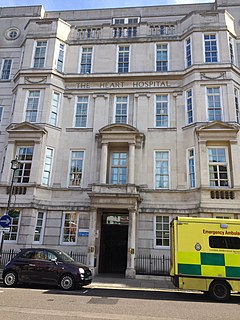
University College Hospital at Westmoreland Street, named The Heart Hospital until refurbished and renamed in 2015, was a specialist cardiac hospital located in London, United Kingdom until 2015. It is part of the University College London Hospitals NHS Foundation Trust and is closely associated with University College London (UCL). After the 2015 refurbishment the hospital now provides thoracic surgery, and urology services.

Sir Alimuddin Zumla,, FRCP, FRCPath, FRSB is a British-Zambian professor of infectious diseases and international health at University College London Medical School. He specialises in infectious and tropical diseases, clinical immunology, and internal medicine, with a special interest in HIV/AIDS, respiratory infections, and diseases of poverty. He is known for his leadership of infectious/tropical diseases research and capacity development activities. He was awarded a Knighthood in the 2017 Queens Birthday Honours list for services to public health and protection from infectious disease. In 2012, he was awarded Zambia's highest civilian honour, the Order of the Grand Commander of Distinguished services - First Division. In 2021, for the fourth consecutive year, Zumla was recognised by Clarivate Analytics, Web of Science as one of the world's top 1% most cited researchers. In 2021 Sir Zumla was elected as Fellow of The World Academy of Sciences.

Great Ormond Street Hospital for Children NHS Foundation Trust runs Great Ormond Street Hospital. It is closely associated with University College London (UCL) and in partnership with the UCL Institute of Child Health, which it is located adjacent to, is the largest centre for research and postgraduate teaching in children’s health in Europe. It is part of both the Great Ormond Street Hospital/UCL Institute of Child Health Biomedical Research Centre and the UCL Partners academic health science centre.

Robert E. MacLaren FMedSci FRCOphth FRCS FACS VR is a British ophthalmologist who has led pioneering work in the treatment of blindness caused by diseases of the retina. He is Professor of Ophthalmology at the University of Oxford and Honorary Professor of Ophthalmology at the UCL Institute of Ophthalmology. He is a Consultant Ophthalmologist at the Oxford Eye Hospital and an Honorary Consultant Ophthalmologist at the Great Ormond Street Hospital. He is also an Honorary Consultant Vitreo-retinal Surgeon at the Moorfields Eye Hospital. MacLaren is an NIHR Senior Investigator, or lead researcher, for the speciality of Ophthalmology. In addition, he is a member of the research committee of Euretina: the European Society of Retina specialists, Fellow of Merton College, in Oxford and a Fellow of the Higher Education Academy.
Ramani Moonesinghe OBE MD(Res) FRCP FRCA FFICM is Professor of Perioperative Medicine at University College London (UCL) and a Consultant in Anaesthetics and Critical Care Medicine at UCL Hospitals. Moonesinghe is Director of the National Institute for Academic Anaesthesia (NIAA) Health Services Research Centre and between 2016 and 2019 was Associate National Clinical Director for Elective Care for NHS England. In 2020 on she took on the role of National Clinical Director for Critical and Perioperative care at NHS England and NHS Improvement.
Carmine Maria Pariante FRCPsych is professor of biological psychiatry at the Institute of Psychiatry at King's College, London, and consultant perinatal psychiatrist at the South London and Maudsley NHS Trust. He also works as the lead for the Affective Disorders and Interface with Medicine theme at the National Institute for Health and Care Research (NIHR) Maudsley Biomedical Research Centre (BRC).
Judith Breuer is a British virologist who is Professor of Virology and Director of the Pathogen Genomics Unit at University College London. She was elected a Fellow of the Academy of Medical Sciences in 2019. Breuer is part of the United Kingdom genome sequencing team that looks to map the spread of the coronavirus disease 2019.
Eleni Nastouli is a Greek clinical virologist who works at University College London Hospitals NHS Foundation Trust (UCLH) and Great Ormond Street Hospital. At UCLH, Nastouli leads the Advanced Pathogen Diagnostics Unit, where she develops technologies for genome sequencing as well as studying how viruses are transmitted around hospitals. During the COVID-19 pandemic Nastouli led an investigation into infection rates amongst healthcare workers.
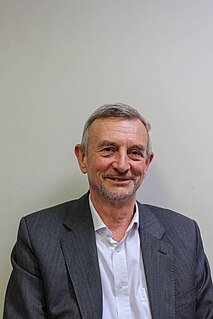
Martin Neil Rossor, is a British clinical neurologist with a specialty interest in degenerative dementias and familial disease.
Rachel Louise Batterham is a British physician who is a professor of Obesity, Diabetes and Endocrinology at University College London. She established the University College London Hospitals NHS Foundation Trust Bariatric Centre for Weight Management and Metabolic Surgery. She has extensively studied obesity, and has contributed to clinical management and the understanding of obesity-related diseases.

